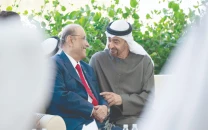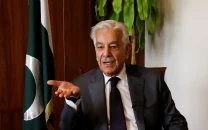Understanding British Muslims post-Woolwich
A small British Muslim minority exists, which would naively wish to see a “Islamic republic of Britain” one day.

The writer is a London-based broadcast journalist and writer. He tweets at @adilshahzeb
The majority of Muslim scholars, community leaders and politicians that I interviewed, urged the Muslim community for introspection. Muslims in Britain admit that they have, perhaps, failed to integrate fully into the wider British society but they also believe that the responsibility of growing radicalisaiton lies with the West, too. The most interesting interview that I conducted while reporting on the root causes of the growing radicalisation was of a British Pakistani Pashtun Saleem (Sully) Rehman, 33, who served in the Parachute regiment of the British Army for eight years. The interview for me summed up the problems and dilemma of those British-born Muslims, who remain hesitant to consider the UK as their home country.
Despite facing pressure from his fellow Muslim friends and others, Rehman opted for a job that the majority of British Muslims even today won’t consider as a career. Rehman’s parents migrated to the UK in the 1960s from Khyber-Pakhtunkhwa. He was born and bred in the UK. He acknowledged that he was once almost ready to join a British radical group but thoughts of a dark future saved his career and he joined the British Army as the first Pashto-speaking British soldier. Today, he is really proud of his decision as many of his friends, who fell for radical views, ended up working in takeaways and restaurants.
British Muslim scholars and politicians do recognise that there is no real acknowledgement of the religious meetings that take place within mosques. Many Muslim children, with English as their first language, attend religious classes daily, taught by a non-British Muslim scholar whose first language is not English. In British Minister Lord Tariq Ahmad’s words, foreign imams have brought their own stream of Islamic radicalisation into the UK, which he refers to as “imported radicalisation”. So, when these kids go to colleges and universities, they become an easy target for radical Muslim groups. Thus, the responsibility for Islamic radicalisation here shifts towards the British government, which has failed to counter the radical preachers and their followers in British educational institutions. The British government does recognise that countering growing Islamic radicalism poses a real threat to the UK, but deciding what is a precise way forward to address the root causes of extremism still seems a difficult task for the authorities.
The Woolwich attack has not only unleashed questions about growing radicalisation among British Muslim youth but also drawn attention to rising Islamophobia and anti-Muslim hate crime. It highlighted the vicious circle of radicalisation and Islamophobia, which exists in the wider British society. Although various British governments have worked immensely in trying to integrate the radical British Muslims, many believe that they have, perhaps, failed in their efforts. The killing of Lee Rugby in al Qaeda style not only reflected the failure on the part of the British intelligence in combating the radical Islamists but it became clear, once again, that a small British Muslim minority exists, which would naively wish to see the “Islamic republic of Britain” in Europe, one day.
Published in The Express Tribune, July 4th, 2013.
Like Opinion & Editorial on Facebook, follow @ETOpEd on Twitter to receive all updates on all our daily pieces.


















COMMENTS
Comments are moderated and generally will be posted if they are on-topic and not abusive.
For more information, please see our Comments FAQ